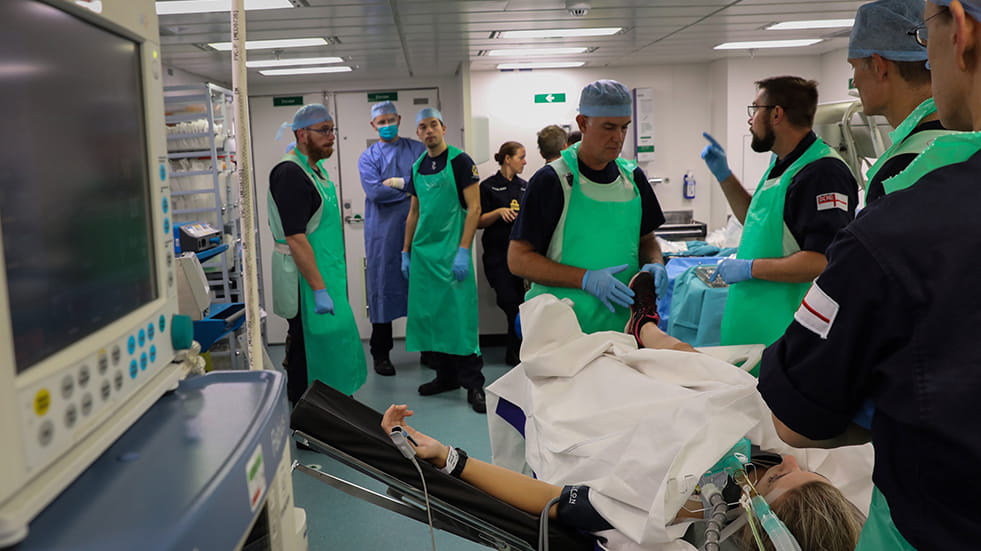Medical Officer Cadet
Get paid to study at university, and gain all the skills you need for life as a world-class medical practitioner.
- £18,000 - £145,000
- Undergraduate Degree
- Surface Fleet
- Medical
- Officer level
6 weeks
Tuition fees paid
£18,000
Free
£60,505
Travel

I’ve learned a lot, both through my medical training at university, and within the Royal Navy where I’ve seen things I never imagined and provided primary and emergency care to personnel around the world.
Role details
What you’ll do
The Medical branch of the Royal Navy is full of dedicated healthcare professionals who support people in the UK and all over the world. And a Medical Officer Cadetship is designed to support the development of the next generation of military practitioners, giving them the skills they will need to tackle uniquely challenging environments, all over the world.
Your journey will start at university, where you’ll be able to apply to finish your studies in the Royal Navy, earning a salary and having the final three years’ fees paid for by us (not including any intercalation year). You'll complete your foundation years within military Joint Hospital Group Unit and go on to serve on board ships, submarines and shore establishments as a General Duties Medical Officer (GDMO), primarily responsible for the provision of first-class health care to our personnel.
Your role
- Following medical school you will complete your foundation training in one of the Joint Hospital Group's (JHG) NHS hospitals, you will complete clinical rotations, including primary care and emergency care before undertaking your officer training at Britannia Royal Naval College, Dartmouth.
- Flexibility is essential. You could be on the battlefield advancing the treatment of trauma victims, or specialising in major disciplines, from surgery to anaesthetics
- Be part of a world-class medical service that’s respected far beyond the Armed Forces
Pay & benefits
- A salary of at least £60,505 once qualified
- Final three years of medical school fees paid for by us
- Six weeks of paid holiday every year
- Free medical and dental care
- Sports and adventurous training opportunities
Skills for life
Qualifications you'll gain
- Funding opportunities to continue personal and professional development and education
- After spending time as a General Duties Medical Officer, the Royal Navy will offer to fund selected specialisms, subjective to service requirement
Skills you'll develop
- How to be a leader and apply your medical knowledge in challenging conditions
- Opportunities to specialise in major disciplines
Eligibility
- Aged 18 to 36
- Cadetships are available for your final three years at a UK medical school (not including your intercalation year)
- 5 grades A*-C (9-4) Including grade 6 (B) or above in English Language and Maths
- A National of the United Kingdom or Dual National
- A Body Mass Index (BMI) between 18 and 28
We are now only taking applications for Medical Students who will be graduating in 2027 or later.
Skills & Interests
- Ambitious and passionate about medicine
- A confident leader
- Always calm under pressure
- Have a spirit of adventure
Joining Process
From picking your role to starting on your first day, these are the steps you'll take to join as a rating.
Submit an application
NB: Applications should be submitted in the first year of university and the full application process must be completed in time for the Cadetship Selection Board which takes place towards the end of the second year of university.
Defence Aptitude Assessment (DAA)
You’ll be tested on: Verbal Reasoning, Numerical Reasoning, Work Rate, Spatial Reasoning, Electrical Comprehension and Mechanical Comprehension.
To prepare, you can practise the DAA
Interview
Medical and eye tests
Pre-Joining Fitness Test (PJFT)
Admiralty Interview Board
Career Progression
Got a question?
Our virtual recruiter is available to answer your questions 24 hours a day
